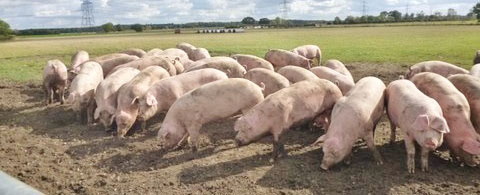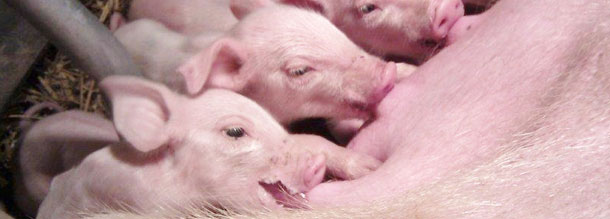 A Nottinghamshire herd has seen increased productivity and performance thanks to cutting-edge genetic technology from JSR.
A Nottinghamshire herd has seen increased productivity and performance thanks to cutting-edge genetic technology from JSR.
The 550-strong herd belonging to Newark-based Allen Farms was starting to show signs of disease, and performance was beginning to tail off so the decision was taken for a complete destock-repop.

The enterprise has over 550 sows on a mixed indoor/outdoor unit. Sows spend most of their time outdoors, but half farrow indoors and half outdoors, with all stock finished indoors on straw.

Des Allen, who runs the business with his brother Robert, explains why he opted for a total destock-repop.
“We have been keeping pigs on this farm for over 50 years,” said Mr Allen, who is also Chairman of the East Midland Pig Health Scheme.
“Slowly, over the years, you pick up different bugs which, once you’ve got, you never entirely get rid of. The danger is you start to learn to live with them. But in the end, we were using more medication than we were really comfortable with – and still not getting the performance we needed. It was taking all the enjoyment out of the job.”
The decision to implement the destock-repop was, ultimately, financial; with the brothers hoping to build a healthy herd in time to hit an improved market, and the operation was completed in 2011.
The restock also coincided with the construction of new finishing accommodation designed to take batches of finishers 75 – 80-strong in each of the two buildings.
The brothers were determined to restock with genetics capable of taking the unit forward and opted to take 500 JSR Genepackers 120 dams which thrive in both indoor and outdoor semi-intensive systems, and use the JSR AI service with the Geneconverter 700 and 750 boar lines to produce lean, fast-growing piglets.

As well as using the JSR AI and Coolink service, the Allens also chose to use Checkmate, an innovative monitoring programme designed to work seamlessly with JSR technology, which provides a realistic production target for any facility and pinpoints any areas causing a shortfall.
The new animals, improved AI services and the Checkmate monitoring system have made for marked improvements in the performance and productivity of the herd.
Des Allen said: “Working with Checkmate and our vet Guy Wade-West, from Garth Vets, we have got AI down to a fine art.
“It gives us the high level of control you need for successful batch farrowing and on average sows and gilts are served at least twice. We’ve done 11 batches now, and of those there’s only been two of 85% conception or less. All the rest have been 90% plus, with one at 96%. Before the destock we were getting around 80-85%.

“This is one aspect that I hadn’t really budgeted for being so much better. Now, due to their better health, they come on heat in a very narrow band of time and we have learnt to be very disciplined.”
With both indoor and outdoor units, Des accepts a degree of variance in his productivity figures.
“We farrowed our first batches at the end of January and are now averaging over 12 born alive indoors and consistently rear over 10.5 – that’s including the gilts,” he said. “Outside, we can rear 9.75 on one batch, but just under 9 on others, so a 1.5 pig difference, which can be very frustrating.
“I think that, eventually, we will move towards indoor farrowing. In the right conditions, outdoor production can be very enjoyable, and good for marketing, but this year the conditions have never been right – it’s been like a 12 month winter.”
The grower and finisher stage has also seen improvement with a ‘very pleasing’ figure of just 2-2.5% mortality.
“The destock has given the whole team a new focus,” says Des. “Working with these healthier pigs you can really see the results of any effort you make.
“Before we sometimes felt we were swimming against the tide. Now that we have been able to put new rules and disciplines into place, and we’re seeing the rewards, the morale of the whole team is high.”
September 5, 2012 - JSR/UK

